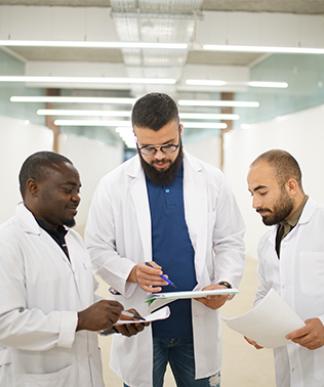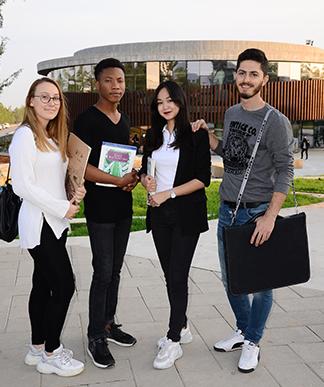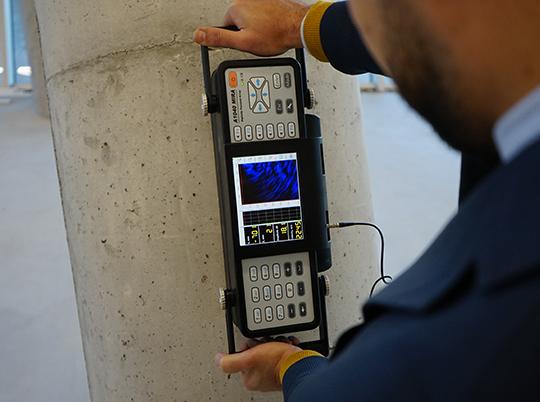


About the Program
The Mechanical Engineering Graduate Program aims to equip its students with solid foundations in the relevant field and also to develop advanced practical and theoretical research skills. The program is based on the rationale that technological products can only be manufactured by combining expertise and creativity with engineering experiences. For this reason, the program is designed to allow students specialize in machine systems and details. Students develop their skills to participate in scientific activities and share their findings with the scientific community.
Education Opportunities
Graduates of the Mechanical Engineering Graduate Program can work as managers in institutions and companies focusing on high technology and practices. The graduates can also find employment opportunities in small and medium enterprises (SMEs), large-scale companies and multinational companies operating in the automotive and machinery sectors. They can take part in national and international projects and R&D activities that are outside the routine practices of daily engineering problems. They can pursue an academic career by completing a doctorate degree and find employment in higher education institutions as academic staff.

Career Areas
Graduates of the Mechanical Engineering Graduate Program can work as managers in institutions and companies focusing on high technology and practices. The graduates can also find employment opportunities in small and medium enterprises (SMEs), large-scale companies and multinational companies operating in the automotive and machinery sectors. They can take part in national and international projects and R&D activities that are outside the routine practices of daily engineering problems. They can pursue an academic career by completing a doctorate degree and find employment in higher education institutions as academic staff.
Contact
Institute of Graduate Studies and Research
Graduate Sciences and Education Center, GE106
Tel: +90 392 671 1111 Extension: 2776
Institute E-mail: ciu-institute@ciu.edu.tr
Compulsory Courses
First Semester
RESEARCH METHODS
Course code
BASC501Credit
3Theoretical
3Practical
0Ects
8ENGINEERING MATHEMATICS: DIFFERENTIAL EQUATIONS & LINEAR ALGEBRA
Course code
MATH501Credit
3Theoretical
3Practical
0Ects
8AREA ELECTIVE
Course code
MCLE5X1Credit
3Theoretical
3Practical
0Ects
8AREA ELECTIVE
Course code
MCLE5X2Credit
3Theoretical
3Practical
0Ects
8Second Semester
SEMINAR
Course code
BASC590Credit
0Theoretical
0Practical
0Ects
4THESIS
Course code
MCLE500Credit
0Theoretical
0Practical
0Ects
60AREA ELECTIVE
Course code
MCLE5X3Credit
3Theoretical
3Practical
0Ects
8AREA ELECTIVE
Course code
MCLE5X4Credit
3Theoretical
3Practical
0Ects
8AREA ELECTIVE
Course code
MCLE5X5Credit
3Theoretical
3Practical
0Ects
8Elective Courses
Principles of Manufacturing Processes
Course code
MCLE522Credit
3Theoretical
3Practical
0Ects
8ADVANCED STRENGTH OF MATERIALS
Course code
MCLE571Credit
3Theoretical
3Practical
0Ects
0Advanced CAD/CAM
Course code
MCLE529Credit
3Theoretical
3Practical
0Ects
8SOLAR POWER DESIGN
Course code
ENRE507Credit
3Theoretical
3Practical
0Ects
EXERGY AND EXERGY-ECONOMIC ANALYSIS OF RENEWABLE SYSTEMS
Course code
ENRE606Credit
3Theoretical
3Practical
0Ects
POWER GENERATING SYSTEMS
Course code
ENRE534Credit
3Theoretical
3Practical
0Ects
PRINCIPLES OF MATERIALS SCIENCE AND ENGINEERING
Course code
MCLE521Credit
3Theoretical
3Practical
0Ects
8TECHNO-ECONOMICAL ANALYSIS OF ENERGY APPLICATIONS
Course code
ENRE502Credit
3Theoretical
3Practical
0Ects
Intermediate Fluid Mechanics
Course code
MCLE582Credit
3Theoretical
3Practical
0Ects
8ENERGY - PAST, PRESENT & FUTURE
Course code
ENRE501Credit
3Theoretical
3Practical
0Ects
0INTERMEDIATE HEAT AND MASS TRANSFER
Course code
ENRE522Credit
3Theoretical
3Practical
0Ects
FUNDAMENTALS OF ENERGY SYSTEMS OPTIMIZATION
Course code
ENRE533Credit
3Theoretical
3Practical
0Ects
RESEARCH METHODS
Course code
EMNT525Credit
3Theoretical
3Practical
0Ects
0THERMAL SYSTEMS DESIGN
Course code
MCLE445Credit
0Theoretical
0Practical
0Ects
6THEORY OF MACHINES
Course code
MCLE572Credit
3Theoretical
3Practical
0Ects
8FINITE ELEMENT ANALYSIS
Course code
MCLE574Credit
3Theoretical
3Practical
0Ects
8INVESTMENT APPRAISAL
Course code
ACFN519Credit
3Theoretical
3Practical
0Ects
0DYNAMICS OF MACHINERY
Course code
MCLE301Credit
0Theoretical
0Practical
0Ects
6MACHINE ELEMENTS I
Course code
MCLE371Credit
0Theoretical
0Practical
0Ects
5MACHINE ELEMENTS-II
Course code
MCLE372Credit
0Theoretical
0Practical
0Ects
6HYDROGEN AND FUEL CELL TECHNOLOGY
Course code
ENRE511Credit
3Theoretical
3Practical
0Ects
THERMAL ENERGY STORAGE PRINCIPLES AND APPLICATIONS
Course code
ENRE604Credit
3Theoretical
3Practical
0Ects
HEAT AND MASS TRANSFER
Course code
ENRE302Credit
0Theoretical
0Practical
0Ects
DESIGN OF ZERO EMISSION 100% RENEWABLE CITIES
Course code
ENRE537Credit
3Theoretical
3Practical
0Ects
RESEARCH METHODS
Course code
BASC501Credit
3Theoretical
3Practical
0Ects
MANUFACTURING TECHNOLOGY
Course code
MCLE312Credit
0Theoretical
0Practical
0Ects
7INTERMEDIATE THERMODYNAMICS
Course code
MCLE511Credit
3Theoretical
3Practical
0Ects
8ADVANCED ENGINEERING THERMODYNAMICS
Course code
ENRE605Credit
3Theoretical
3Practical
0Ects
HIGH VOLTAGE UNDERGROUND CABLES
Course code
EELE555Credit
3Theoretical
3Practical
0Ects
FLUID MECHANICS
Course code
MCLE382Credit
0Theoretical
0Practical
0Ects
6Students who are interested in pursuing advanced graduate studies leading to a master’s, doctoral degree, or professional doctorate degree for the Fall and Spring semesters every year. Applicants can directly apply online to our graduate programs using the application portal.
TRNC Applicants- Required documents:
- Bachelor’s Degree Diploma
- Bachelor’s Degree transcripts for each completed academic term/year.
- Documents to prove English proficiency for English language departments,
- Scanned copy of passport or identity card.
Click for detailed admission requirements information.
Students who are interested in pursuing advanced graduate studies leading to a master’s, doctoral degree, or professional doctorate degree for the Fall and Spring semesters every year. Applicants can directly apply online to our graduate programs using the application portal.
International Applicants- Required documents;
- Bachelor’s Degree Diploma
- Bachelor’s Degree transcripts for each completed academic term/year.
- Evidence of English Language competence: TOEFL (65 IBT) or IELTS (5.5). Students without these documents will take the CIU English proficiency exam on campus following arrival.
- Scanned copy of international passport/birth certificate
- CV
- Fully completed and signed CIU Rules and Regulations document (which can be downloaded during the online application)
Click for detailed admission requirements information.
Cyprus International University provides academic scholarships for its students as an incentive for success, with most students benefiting from 50%, 75% or 100% scholarships or discounted tuition fees. Click for more information.
Tuition Fees are determined at the beginning of each academic year. Candidate students who are entitled to enroll in CIU can learn their fees in line with the Tuition Fee Calculation system.